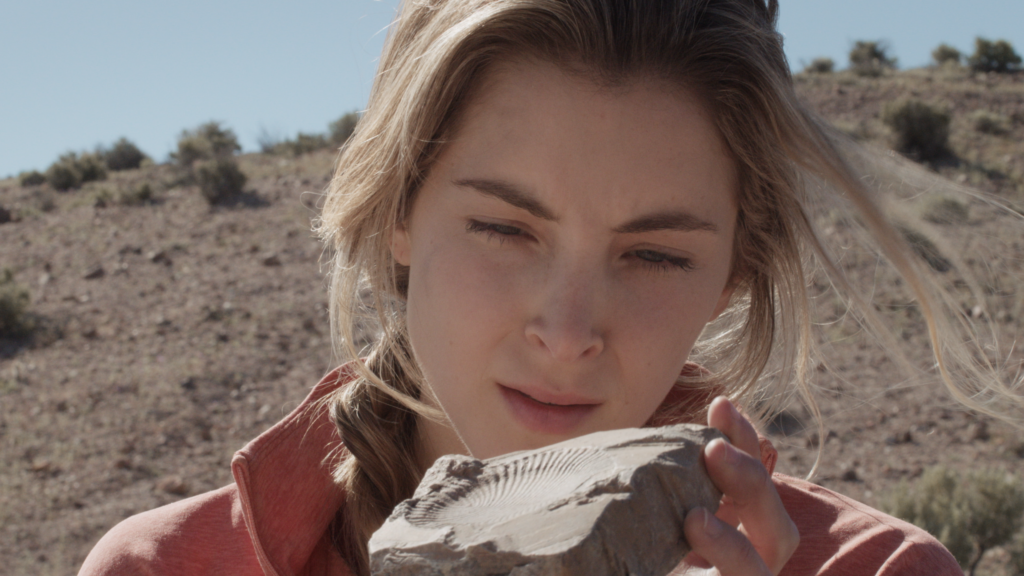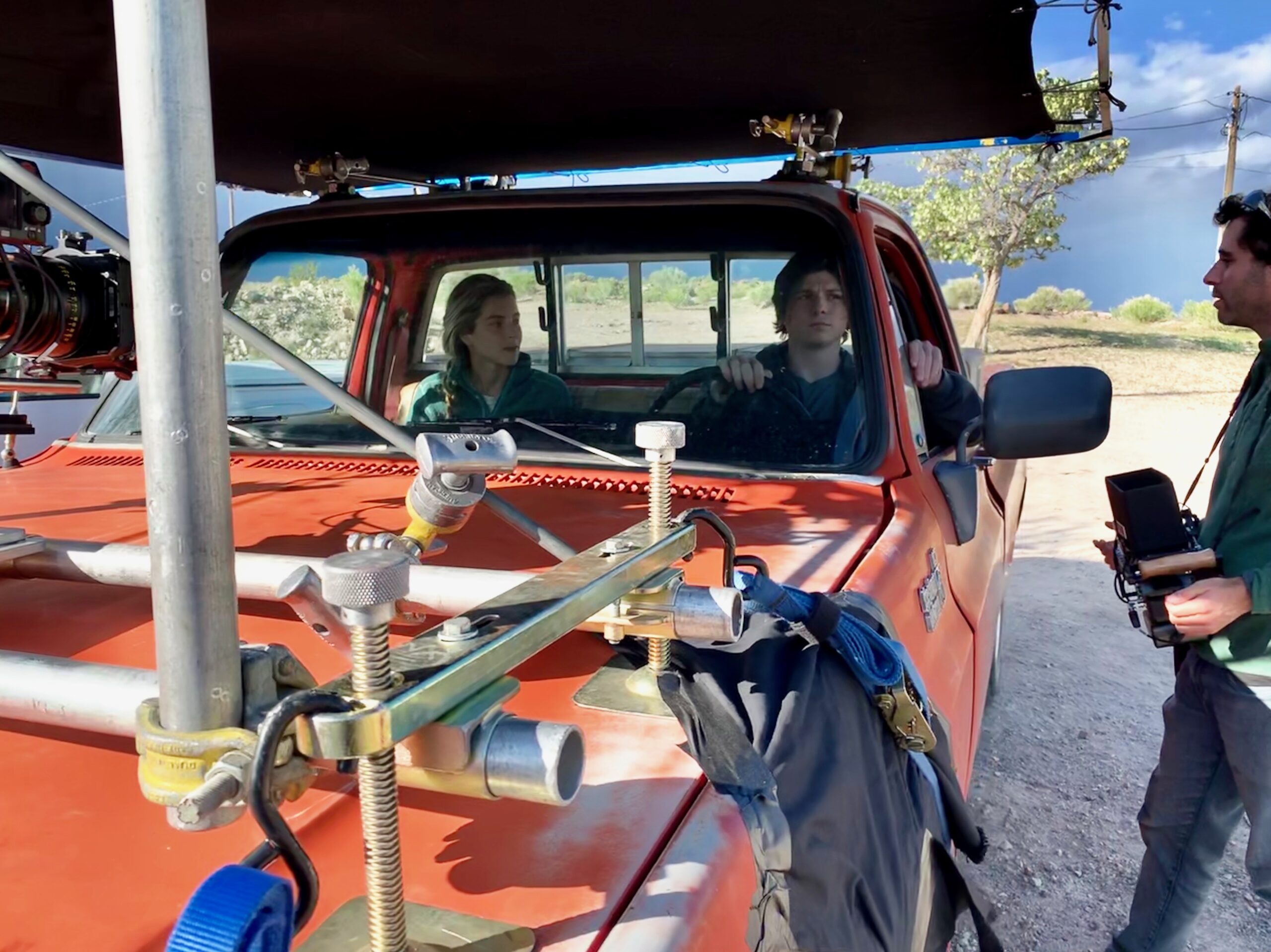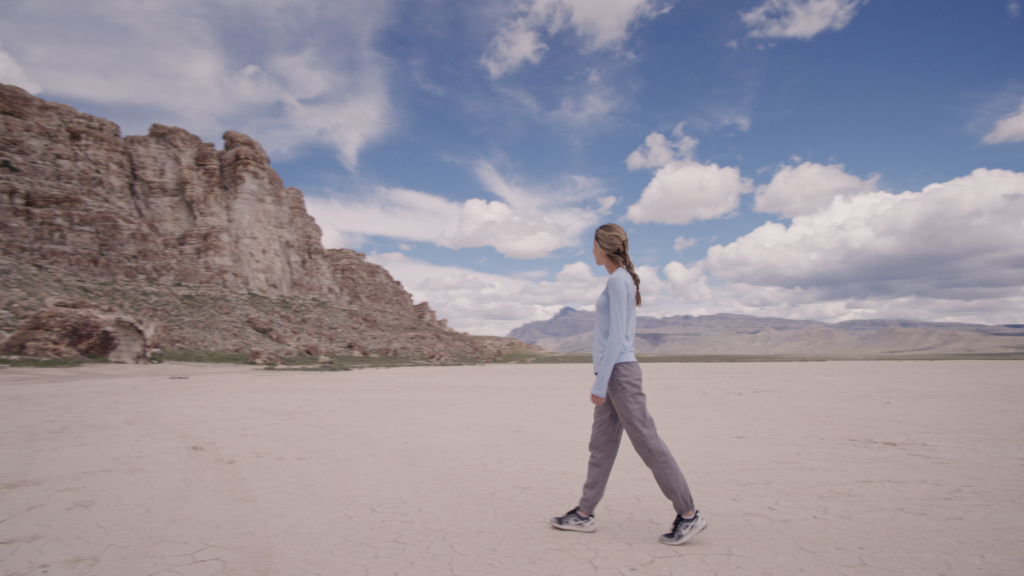When Alex, a Massachusetts graduate student, has her idea for a new research project stolen by an unscrupulous lab partner, she embarks on an ambitious solo expedition in the California desert, intent on making a discovery that will prove to her peers and the geology community exactly how much she has to offer.
This is the premise of the new feature film Unconformity, released this August in North America and soon debuting worldwide. The first feature film from New York-based writer/director Jonathan DiMaio, Unconformity takes a stark look at what students like Alex face in university settings and doing field research. Throughout the film, Alex reels from her betrayal, while uncovering a world where climate change, land rights, and a collapsing local economy entangle in ways far beyond her campus experience. It’s also a rare film that puts geology—specifically petrology—in the spotlight, showing a fictionalized-yet-familiar journey of someone devoted to understanding themselves through immersion in nature and the field of earth science.
It’s a complicated nexus of topics to explore in 90 minutes of screen time, but DiMaio—with assistance from his charismatic star Alex Oliver and some breathtaking cinematography—is up to the task. Ahead of his upcoming Pardee Keynote Symposia at GSA Connects 2022, GeoScienceWorld spoke with DiMaio about the impetus for Unconformity and how he made topics like academic fraud and Ediacaran fossils into the backdrop for a story about loss and self-discovery.

This interview has been edited for brevity. Major plot details have been omitted, but this interview may contain minor spoilers for Unconformity.
Jerry Fagerberg: How did you find this topic? And why did you make it the subject of your first feature film?
Jonathan DiMaio: I wanted to make something about the climate crisis, even if it was indirectly about it. A friend of mine is now a professor at [California Institute of Technology]. This was 10 years ago, and I was hopping around on film sets, working at odd jobs, and she was like, “Do you want to come back to the desert for a month?” I had just finished shooting a short, and she was leading a class of MIT undergrads. I was like, “That sounds great.” So I just drove around the desert for a month meeting these MIT undergrads and spending time with geologists. It was this really amazing experience being out in the desert. And we were about an hour away from Needles, California, just on the border of Nevada, California, and Arizona. I started reading about what I was seeing out there. Soon after that, the Bundy family took over the highway overpass, and there was a standoff with the ranchers. I started reading about land rights in the west and more about geology, and I realized there were really interesting things happening out there I wanted to discuss.
At the same time, I’d experienced being taken advantage of in the film world by an abusive mentor. A famous film director basically took advantage of me. I wanted to talk about that but not make a story about myself. That’s where the central arc of Alex came in with her relationship to her advisor.
I spent a lot of time doing outreach in Nevada and met a cattleman with both mining experience and a potential filming site. He was like, “Come out and shoot the property.” It turned out that he was situated right where someone had discovered some Ediacaran fossils, and so the stories melded together.
JF: This would be a really great movie even if there were no people or dialogue in it. It’s just shot so beautifully. How did you find the locations for the film?
JD: We found a ranch that was near Death Valley, and so you can see Telescope Peak in the background of one of the shots. We really tried to find rocks like that would actually have Ediacaran fossils. I know that some of the fossils she finds are only, in real life, found in Australia, and that’s part of the point. We tried to find actual places where these huge Ediacaran fossils could be found, so that guided us.
Because we had the rock climbing, I had to be able to bring a film crew to a rock climbing location. There aren’t many places around Nevada where you can do that, you have to hike in, and you can’t bring a truck out. I spent time reaching out to the rock climbing community, and eventually we found a place in Utah on the west desert called Ibex that has a hard pan you can drive out onto and has these amazing red cliffs. I was really lucky in that I had an incredible Director of Photography, Hana Kitasei.
JF: How did you first come across the term “unconformity”? Why did you think it was like a good title for the film?
JD: I first came across it when I went out west. The group had just visited the Grand Canyon, and they were looking at the Greater Unconformity. It became a metaphor in a number of ways: having an unknown can just be fundamental in a number of different ways, geologically and otherwise, and I liked that.
JF: The film addresses so many fraught things about geology. Not only do you have the land rights issue, there’s a bit about mining and economic collapse, and then you have the power structures of academia falling apart. How did you make sure that you got that all right?
JD: It was hard. I interviewed a lot of people, and I spent time with them. There are things that I think I could have done a little bit better. It was hardest speaking with the Bureau of Land Management. They were very touchy, because they’ve been so hated by so many different sides, so they were really concerned. I wanted to make a story that was nuanced, and I had people telling me, “You have to make a movie about wild horses, you have to make a movie about this or that.”

JF: How much of Alex’s experience living out on that ranch is dramatized? How much is a real experience that academic geologists might have in the field?
JD: There are definitely people that are going out to Death Valley and spending a year by themselves doing research. Men are more willing to do it than women, for safety reasons, and that’s one thing I struggled with. Alex is a woman going out into the desert, and one of my regrets is not showing her taking more precautions.
When she undercooked the bacon, that’s something that happened to me, and I passed out on a subway in New York one morning. I wanted a kind of amusing desert meet cute that wasn’t cute at all. I was working on the story, and I had that experience on the subway, and it got into the movie, so that had nothing to do with geologists.
JF: What about the character of Alex? She is very assured, very confident. She knows what she wants. Where did you get that character from?
JD: I don’t really know, actually. She’s very confident, she knows what she wants. She’s a selfish person, at various points in the film, and I wanted her arc to have this realization, so it made sense for her to start in a certain place and end in a certain place. It wasn’t based on a particular experience. It’s been interesting seeing people react to that. Some people like her a lot, and other people really dislike her. It’s not the point of a movie to make a character that everyone loves.
JF: The problems that Alex faces in academia—getting her idea for a project stolen by her lab mate and the subsequent issue with her advisor—are very real situations that arise.
JD: I have friends in academia who have told me about crazy stories, and I remember it happening when I was an undergrad. I can’t speak to how often it is happening or in this specific context, but it’s certainly not just geology. In any competitive field, people are going to compete in underhanded ways.
In film, it’s terrible. We know we all about what happened with the #MeToo movement, and a lot of it was centered in the film industry. It happens everywhere, and communities that are more marginalized are less able to defend themselves when it does happen. There’s a reason that the panel that decides that Alex’s claim is not valid is three white dudes. That’s how it often works out. I know that geology is one of the whiter, more male fields, and a lot of geologists care a lot about making the field more inclusive.

JF: What did you want the audience to take from watching Unconformity?
JD: For the non-geologists, I really would love people to have a better understanding of what certain geologists do. Alex is a very particular type of geologist, and she doesn’t do what many other geologists do, but I was very lucky to get the experience I had traveling out west and spending time with geologists and seeing how they look at the land and how they spend time out there.
For the geology audience, I hope they enjoy it. They get to have a movie about themselves that they get to experience, and enjoy, and nitpick, and talk about. I hope they’re able to empathize with the characters and see how it reflects on what they’re doing, their work, and how they’re treating each other.
JF: Now that the movie is out, what are you hoping to do next?
JD: I’ve produced a couple of short films and comedies that were taken out to the festivals. I’m working on a couple of horror shorts. In horror and suspense movies, the camera has to be in a very specific place at a very specific time with the right lens and the right lighting, otherwise, it doesn’t work. As a young filmmaker, it appeals to me to be forced to really figure out exactly where that is, and practice in that way. Aside from that, I’m thinking about other features in the future. I lived in the Dominican Republic for a while working for a nonprofit, so I’m working with a friend of mine who’s from there, and we’re writing some short projects that we might try to expand into a feature at some point.
You can watch Unconformity on Tubi or Amazon Prime Video.
To learn more about Unconformity and to set up a screening at your institution, visit the Unconformity website.
